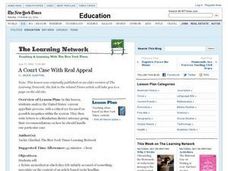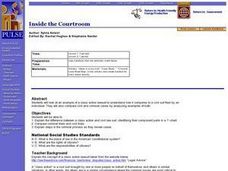Judicial Learning Center
The Appeal Process
Why doesn't the Supreme Court hear testimony from witnesses? How do they complete an entire proceeding in less than two hours? A helpful lesson guides scholars of criminology through these and other questions by explaining how appeals...
Curated OER
Crime Time
Young scholars examine fundamentals of American criminal justice by analyzing each step of the criminal process. They follow the process of a well-known or publicized criminal case in The New York Times, and keep a journal of its...
School Improvement in Maryland
Court Proceedings Civil Cases
What's the difference between civil and criminal law? How do the court proceedings differ in these two types of trials? How do the standards of proof differ? Why do these differences exist? As part of their examination of the US court...
Curated OER
Due Process Freedoms
Students participate in a simulation of the voir dire portion of a trial. There are student lawyers assigned for the prosecution and the defense. They must review and question all prospective jurors to obtain a fair and impartial jury.
Curated OER
Adult Criminal Justice System
Twelfth graders examine the procedures and protections involved in processing an accused person through the criminal justice system. They view a Powerpoint presentation, conduct research, and write a paper describing a crime they have...
Judicial Learning Center
Your Day in Court
Whether out of choice or necessity, people want to know what will happen on a typical day in court. A helpful lesson walks scholars in the field of criminology through the trial process from opening statements to the final verdict.
Judicial Learning Center
Types of Court Cases
How can one court acquit someone of a crime, while another convicts the person of the same one? It's all because of the differences between civil and criminal trials. An informative resource provides scholars in the field of criminology...
Judicial Learning Center
Your Day in Court: Criminal Justice
When a person goes on trial for a crime, what options does a court have to render justice? Who are the key players in the legal system? Interested legal scholars answer the inquiries and more using an Internet-based activity, chart, and...
Curated OER
The Ongoing Debate: Crime Control v. Due Process Protection
Young scholars investigate the Exclusionary Rule and other ways of to enforce the protections found in the Bill of Rights. They study how effective criminal control and public safety is carried out while citizens Constitutional rights...
Curated OER
What Makes a Good Law?
Why were laws created? Spark a group discussion on why we need laws to co-exist. Should the sale of some things be outlawed on Sundays? Read a case summary between Target and the state of Minnesota that debated this issue. Ask your...
Curated OER
Enriching Students' Understanding of Criminal and Tort Law Using Technology
Students define criminal and tort law and explain how they are different.
Curated OER
Crime and Justice
Students investigate what happens when someone is arrested. They engage in a mock trial role play about a burglary. They engage in the process of the Criminal Justice System from arrest to sentencing.
Curated OER
Government Lesson Plan: Lesson Plan 9
Learners examine and compare/contrast the steps of criminal and civil cases. They define key vocabulary terms, develop an outline of a criminal and civil trial, and analyze the differences in standards of proof in legal cases.
Curated OER
Trials and Tribulations
Students explore their beliefs about objectivity and the United States justice system. They examine the facets of a criminal case by researching various aspects of the judicial system and apply what they have learned to the Michael...
Curated OER
Gideon v. Wainwright
Students examine the right to counsel and due process. For this Supreme Court lesson, students examine primary documents from Gideon v. Wainwright and discuss the implications of the decision.
Teaching Civics
Legal Ways: Extended Jurisdiction Juvenile
An amazing set of resources! Found here are several lessons that work in conjunction to help learners better understand the juvenile court system. Learners review the judicial process, discuss how juveniles are tried, and hold a class...
Judicial Learning Center
Getting Ready for Trial
A courtroom can be a scary place for the uninitiated. Get familiar with the process using a helpful overview of the activities that take place prior to both civil and criminal cases. The lesson explains the differences between civil and...
BBC
Crime
Crime and punishment! Learners discuss the law, civics, and crime in the UK. They brainstorm lists of crimes and possible punishments, complete activities on a website, role-play a Juvenile Court scenario, and try to think of ways they...
Curated OER
The Youth Criminal Justice Act
Students review the Youth Criminal Justice Act and examine the consequences for young people who commit crimes. They investigate the rehabilitation and reintegration processes associated with the act.
Curated OER
The Trial Process
Students explore the trial process as a guest speaker visits the classroom.
Curated OER
A Court Case with Real Appeal
Learners analyze the United States' current appellate process, with a critical eye focused on possible inequities within the system. They then write letters to a Manhattan district attorney giving their recommendations on how he should...
Curated OER
Supreme Court Confirmation Process
Students examine the Supreme Court and the confirmation process. They simulate a confirmation hearing with students role-playing as nominees and others as members of the Judiciary Committee. Students compose short essays outlining the...
American Documentary
The Benefits and Drawbacks of Plea Bargains
The outcome of 90 percent of criminal cases in the US is determined by plea bargains. Clips from the documentary Better This World create the backdrop for an investigation of the benefits and drawbacks of the plea bargaining process....
Curated OER
Inside the Courtroom
Twelfth graders explain the difference between a class action and civil law suit. In groups, they compare and contrast criminal and civil trials and review various cases. They determine the place of law in the American constitutional...

























